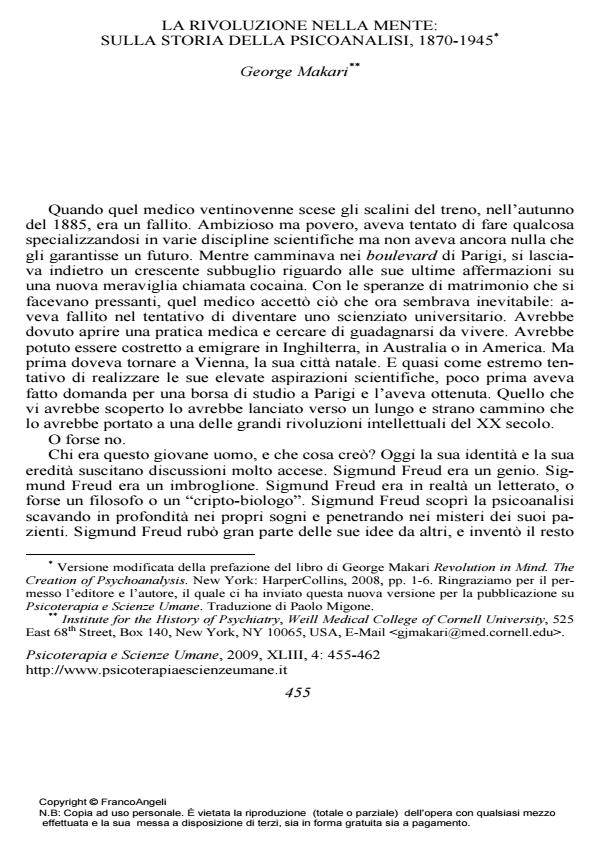La rivoluzione nella mente: sulla storia della psicoanalisi, 1870-1945
Titolo Rivista PSICOTERAPIA E SCIENZE UMANE
Autori/Curatori George Makari
Anno di pubblicazione 2009 Fascicolo 2009/4
Lingua Italiano Numero pagine 8 P. 455-462 Dimensione file 298 KB
DOI 10.3280/PU2009-004001
Il DOI è il codice a barre della proprietà intellettuale: per saperne di più
clicca qui
Qui sotto puoi vedere in anteprima la prima pagina di questo articolo.
Se questo articolo ti interessa, lo puoi acquistare (e scaricare in formato pdf) seguendo le facili indicazioni per acquistare il download credit. Acquista Download Credits per scaricare questo Articolo in formato PDF

FrancoAngeli è membro della Publishers International Linking Association, Inc (PILA)associazione indipendente e non profit per facilitare (attraverso i servizi tecnologici implementati da CrossRef.org) l’accesso degli studiosi ai contenuti digitali nelle pubblicazioni professionali e scientifiche
Revolution in mind: on the history of psychoanalysis, 1870- 1945 - In opposition to the traditional historiography of psychoanalysis, based essentially on biographies, the creation of psychoanalysis is seen as both a body of ideas and a movement that can be better understood by focusing on the way this field constituted itself, broke apart, and then rebuilt itself prior to World War II. Outlining the argument of the author’s book, Revolution in Mind: The Creation of Psychoanalysis (New York: HarperCollins, 2008), it is argued that a distinct Freudian theory emerged from Freud’s engagements with three pre-existing fields: French psychopathology, German biophysics/psychophysics, and sexology. As Freud pulled them together in an new synthesis, followers from these fields found their way to him. But a series of schisms shattered Freud’s fragile movement. After World War I, a new community emerged that was more "psychoanalytic" than "Freudian". It placed less emphasis on Freud’s authority, and instead emphasized technique and professionalization. World War II led to the destruction of these communities and sparked battles for control in the two major centers that remained, London and New York.
Parole chiave:Freud, Freudians, psychoanalysis, historiography, intellectual communities
- Le risposte Marianne Leuzinger-Bohleber, in PSICOTERAPIA E SCIENZE UMANE 3/2016 pp.500
DOI: 10.3280/PU2016-003035 - Da Ferenczi a Reich: analogie tra fisica e psicoanalisi Riccardo Gramantieri, in PSICOTERAPIA E SCIENZE UMANE 1/2015 pp.59
DOI: 10.3280/PU2015-001003 - Un New Deal per le terapie psicodinamiche: lo psicoanalista come burocrate di strada Jeremy Clarke, in PSICOTERAPIA E SCIENZE UMANE 2/2024 pp.199
DOI: 10.3280/PU2024-002002
George Makari, La rivoluzione nella mente: sulla storia della psicoanalisi, 1870-1945 in "PSICOTERAPIA E SCIENZE UMANE" 4/2009, pp 455-462, DOI: 10.3280/PU2009-004001